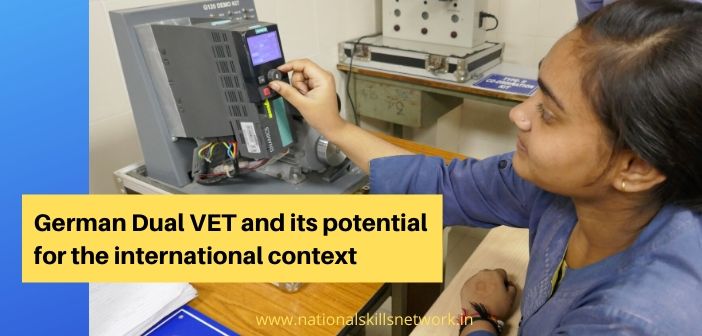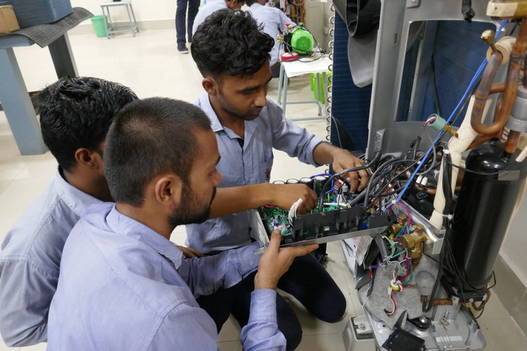 There has been an increasing awareness worldwide that skilled workers are a necessity for sustainable economic growth. This is supported by the fact that skilling the youth is the most suitable measure to make them employable and help them transit to the job market. Besides, it also helps them in self-employment and opens a path towards entrepreneurship and job creation.
There has been an increasing awareness worldwide that skilled workers are a necessity for sustainable economic growth. This is supported by the fact that skilling the youth is the most suitable measure to make them employable and help them transit to the job market. Besides, it also helps them in self-employment and opens a path towards entrepreneurship and job creation.
While devising policies for skilling and Vocational Education and Training (VET) or making amendments to existing schemes, many countries look upon certain European countries as a source of inspiration and as a trailblazer in overcoming economic crises. It is a proven fact that, at the time of the financial crisis, European countries like Germany, Switzerland, Austria and Denmark with a strong VET system also only had modest youth unemployment rates. Other countries in Europe, for instance, like Greece and Spain, had high youth unemployment rates since their education system was not strengthened through demand-driven vocational base.
Germany acquired a distinguished place through a well-founded dual VET system, where the origins could be traced back to the medieval times. The prevalence of various guilds and their role in training the youth in different trades through apprenticeships has laid a foundation that has been enhanced in later years with collective efforts of the industry, academia and the government. The mutually beneficial system which has evolved over time is now often seen as a model across nations to design, implement and derive policy recommendations for new initiatives or modernize existing VET systems.
 Even though India has advocated the adoption of the German Dual VET system and there are few instances of its adaptation, a thorough understanding of the principles on which the system is based could help stimulate the ongoing debates regarding VET reforms and initiatives. Especially, for emerging countries like India, the path to integrate new ideas and make them work in a historically grown education and VET system has many challenges. Apart from the difference in governance structure, sociocultural perception of education in India and how it is related to individual development, employment and so on are key factors to understand and engage with the model.
Even though India has advocated the adoption of the German Dual VET system and there are few instances of its adaptation, a thorough understanding of the principles on which the system is based could help stimulate the ongoing debates regarding VET reforms and initiatives. Especially, for emerging countries like India, the path to integrate new ideas and make them work in a historically grown education and VET system has many challenges. Apart from the difference in governance structure, sociocultural perception of education in India and how it is related to individual development, employment and so on are key factors to understand and engage with the model.
Although Germany is often perceived as a role model, it would not be where it currently stands, if it was not able to slowly develop and establish its system over many centuries. It is important to acknowledge how the system has evolved over the years by constantly and systematically tackling new challenges to meet the changing demands of the markets. Thus, similarly to Germany, every country, that is keen on building a sustainable and rewarding VET system has to address two questions, over a period, as it evolves:
- How do we train according to industry needs and standards over time?
- How do we guarantee the quality of training over time?
The German VET system has five quality features which taken together provide solid framework for strong and dynamic dual VET system and which are form the basis of the strategy of the German government to promote international cooperation in VET. These are:
1. Learning within the work process to acquire hands-on skills and work autonomously
In Germany, Dual VET means a combination of learning within the real work situation and school-based learning. In fact, the students spend 70% of their time in the company, undergoing practical training and 30% in the vocational schools for theoretical learning. There are many variants of this model followed by countries that have often emulated the German Model. South Korea, for instance, has adapted the model to suit their needs for a work-integrated approach to holistic education.
VET trainees learn the standards of their respective occupation they are working in and the theoretical foundations of their trades as well as other skills needed in today’s world of work (i.e. digitalization skills)
To know more, visit: https://www.bibb.de/govet/en/13742.php
2. Joint responsibility of state, employers and employees in trade and industry
By working together, the state, trade and industry and the social partners can secure the basic conditions under which vocational education and training can take place. These range from sharing funding to developing and implementing curricula and extend to include the testing and certification of competences, which have been acquired through independent actors.
To know more, visit: https://www.bibb.de/govet/en/13711.php
3. Acceptance of national standards for consistent and quality performance across the different federal states
Inter-company occupational standards and uniform examination standards guarantee the quality of qualifications. Comparable training qualifications and certificates form the basis for employability, mobility and social acceptance and foster lifelong learning. Furthermore, occupational standards are regularly reviewed and modernized when and where needed according to industry needs.
To know more, visit: https://www.bibb.de/govet/en/16365.php
4. Qualified VET staff who can teach and train by combining pedagogy and industry experience
The training which teaching and training staff undergo is a central quality component. An integrated VET concept requires teachers and trainers to combine the qualities of pedagogue and skilled worker within the same person.
To know more, visit: https://www.bibb.de/govet/en/66950.php
5. Institutionalised research and consultation to meet the needs of technical, economic and social development through VET
Educational and labour market research enable ongoing adaptation of vocational education and training to meet technical, economic and social development. Occupational information and advice provide support in the selection of initial and continuing training measures and in making the transition to the employment system.
To know more, visit: https://www.bibb.de/govet/en/66939.php
More information on VET research conducted by BIBB: visit: https://www.bibb.de/en/25506.php
India: Skill development for a strong economy
India’s human capital can play a significant role in the development of the country and participate as global workforce. An important prerequisite: India needs to count on skilled workers. The country therefore focuses on skill development. Not only the demand for a skilled workforce, but also digital technologies have made it imperative for India to embark on many programs to address issues with growing skill gaps. With this goal, many initiatives for training the youth as per industry requirements are being implemented. Investing in skill development is also prioritized as a strategic component of the development agenda to help dropouts, underprivileged and marginalized become economically independent.
 Skill development and vocational training, over the last 10 years, has been in the limelight through policy interventions, advocacy, funding and institutional support and important steps have been made. This has included among other things the setting up of the Ministry of Skill Development and Entrepreneurship at the center in addition to many individual ministries implementing their own schemes. The NSDC has been founded that performs the role of a catalyst and supports implementation through funding, advocacy, monitoring, and industry partnerships. Moreover, the State Skill Development Missions has been formed at the state-level along with existing Employment Generation Department, Training and Labour Department, working with livelihood missions. Industry bodies like CII, FICCI, ASSOCHAM and Sector Skill Councils (SSCs) actively participate. Schemes like SANKALP (for improving district level implementation) and STRIVE (for modernizing the ITIs) have been implemented as well as higher education degree programs in work-integrated learning model, partially based on German Dual model.
Skill development and vocational training, over the last 10 years, has been in the limelight through policy interventions, advocacy, funding and institutional support and important steps have been made. This has included among other things the setting up of the Ministry of Skill Development and Entrepreneurship at the center in addition to many individual ministries implementing their own schemes. The NSDC has been founded that performs the role of a catalyst and supports implementation through funding, advocacy, monitoring, and industry partnerships. Moreover, the State Skill Development Missions has been formed at the state-level along with existing Employment Generation Department, Training and Labour Department, working with livelihood missions. Industry bodies like CII, FICCI, ASSOCHAM and Sector Skill Councils (SSCs) actively participate. Schemes like SANKALP (for improving district level implementation) and STRIVE (for modernizing the ITIs) have been implemented as well as higher education degree programs in work-integrated learning model, partially based on German Dual model.
The involvement of different stakeholders is expected to synchronize many efforts aimed at providing industry-ready workforce by keeping a tab on the labour market. Since most initiatives are at the systemic level and in a nascent stage, they are yet to show desired results in terms of increase in employment and addressing the industry demand. Moreover, other questions might need to be addressed soon, such as nationally accepted standards and their modernization over time etc., quality assurance, etc. where a constructive dialogue with Germany could be fruitful.





Comments 2